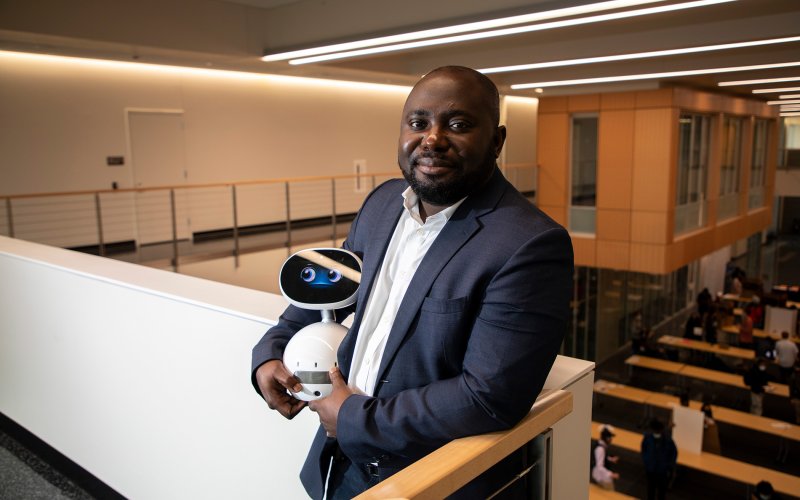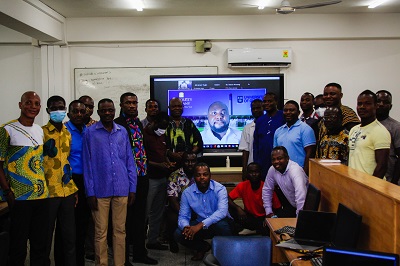Cybersecurity Professor Inspires Ghanaian Students to Pursue Their Dreams

ALBANY, N.Y. (Dec. 7, 2021) — Benjamin Yankson’s journey into academia was unconventional — a success story that he hopes can inspire a new generation of students living in his West African hometown and in other underserved communities around the globe.
Yankson, an assistant professor in the College of Emergency Preparedness, Homeland Security and Cybersecurity (CEHC), was born in Agona Swedru, a town of about 70,000 people in the Central Region of south Ghana.
He left home at age 17 in pursuit of higher education, briefly living with his father in Ontario, Canada, and then on his own, working odd jobs on his way to earning a bachelor’s degree in information technology at Ontario’s York University. He returned to college 8 years later to pursue graduate studies at the University of Ontario Institute of Technology, earning a master’s degree and eventually a PhD in computer science. A total of 20 years from start to end.
Following a career in Canada’s healthcare and education IT industry, he worked as a professor of cybersecurity at Sheridan College in Ontario for four years before joining UAlbany through CEHC in 2019.
Yankson visited Agona Swedru over the summer for the first time in a decade to share his story.
He partnered with Nobles-Swedru, a non-governmental social development project group, to lead a week-long cybersecurity clinic in July for around 30 local high-school-aged students who were eager to learn. The students were offered an introductory course into the field, along with career mentorship, all from inside a new Information & Communication Technology (ICT) lab that Nobles-Swedru funded. It includes around 20 computers with internet access.
“Most African countries are currently going through a digitization wave. As the digital economies in these countries continue to develop, there’s naturally going to be an intrinsic need for more cybersecurity experts,” Yankson said. “Returning home to Ghana this summer to offer an introductory cybersecurity course was my way of giving back. It was very well received.”
Global CyberTech Exchange

Following the success of his trip, Yankson is now collaborating with CEHC graduate student Elisabeth Dubois and Alex Kumi-Yeboah, an associate professor at the School of Education, who is also a Ghana native, to create a new program called Global CyberTech Exchange. It is a fully volunteer operation where experts, teachers, community members and students from around the world exchange technology and cyber knowledge and expertise to improve global security posture.
As part of the program, Global CyberTech Exchange will host continuous cybersecurity clinics, workshops and training opportunities for communities that have limited educational opportunities and resources available. Locations will rotate, both in the United States and abroad, through partnerships with advisors and program partners.
The program will run through Yankson’s “Hack-IoT” lab in UAlbany’s new $180 million, 246,000 square-foot ETEC building and include opportunities for CEHC undergraduate and graduate students to earn credit hours through building course materials and hosting program clinics. There may be future opportunities for students in the program to visit UAlbany as well, creating a new pipeline back to the University.
“We are seeking to break down digital barriers and fill digital skill and employment gaps around the world,” said Dubois, a PhD student in Information Science and director of marketing and strategic initiatives at The Global Child. “I have seen firsthand through my experiences that, when given the opportunity to study and learn, a student is not only able to excel and recognize their full potential, but also create a brighter future for themselves, their families and communities. No matter one’s age, gender, race, socioeconomic status or education, they should — and must — be afforded the same opportunities and support.”
Yankson is currently in discussions with several interested private businesses, non-government organizations and other potential funding partners to support the program.
“It’s important for these students to hear from someone, like me, who grew up in a marginalized community and has found career success,” Yankson said. “My message is simple. Dream big and beyond your current situation. Anything is possible if you make the right connections and work hard at it.”
Visit the Global CyberTech Exchange website to learn more about the program.




